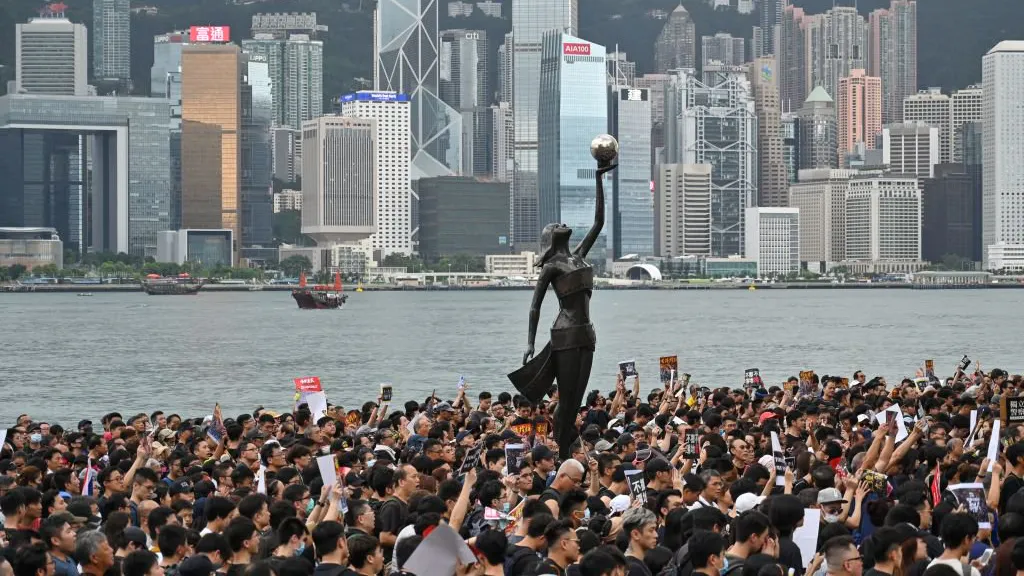The population of Hong Kong has been out en masse protesting for months. The protestors have seen their rights and liberties slowly chipped away by the Chinese government. This gradual reduction of freedoms has been a decade-long process, but recent legislation was a bridge too far for the people of Hong Kong. The legislative boiling point was an extradition bill that would have allowed Hong Kong residents to be transferred and tried in mainland China courts.
Even though Honk Kong is officially part of China, their history kept the island distinct from the rest of the country, both culturally and legally. Hong Kong was seceded to the British by the previous Chinese dynasty in 1842, and the territory remained a British Colony almost uninterrupted for the next 150 years. The mainly Cantonese native population of the island colony was entitled to the freedoms and liberties guaranteed to all citizens under the British Crown. The citizens enjoyed a much higher income compared to those on the mainland, as it was a major trading port, with the economy running under a laissez-faire capitalist model, while mainland Chinese lived under a system that lacked civil liberties and free markets. China would consolidate and fracture in constant cycles of volatility for the next 100 years. During this time, the Hong Kongese found refuge in the stability of their island, and Hong Kong grew to be culturally and economically independent from the mainland.
According to The South China Morning Post, in 1982, Deng Xiaoping, the effective dictator of China, told Margaret Thatcher that they would just take the islands by force if Britain did not willingly hand it over. She knew this to be true and was forced to negotiate the handover of Hong Kong. Britain relinquished the territory in 1997, but in the negotiation the U.K. was able to secure the freedoms and liberties that the population had grown to expect. These protections were stipulated in a document known as the “Sino-British Joint Declaration.” Rights such as freedom of speech, democracy, and the ability to have a fair and impartial trial were to be preserved for 50 years after the handover, known as the “One country, two systems” policy.
The protesters, many of whom used to live under British Dominion, believe these guarantees are being rolled back prematurely. In response they have risen up in protest to stop the regression of their rights. In 2014 the “Umbrella” protests occurred in which half a million people rose up against a bill requiring politicians to be approved by the Chinese Communist Party before they were allowed to run for office. The public pressure was so great that it forced the authorities to relent.
The current controversy started from a homicide case in Taiwan. A Hong Kong man was suspected of committing the crime, and the Hong Kong government wanted the accused to be extradited to face trial in Hong Kong. The two entities currently do not have an extradition treaty in place. In response, a bill was proposed in the Hong Kong legislature to allow for an extradition agreement. The controversy arose when it was discovered that the bill’s provisions would also allow for a suspected criminal to be extradited to mainland China.
The Hong Kong population saw this as a direct threat to their freedoms, as any citizen would be capable of being tried in the mainland. In the People’s Republic of China, death penalty cases are usually decided in under 20 minutes, and the criminal justice system has a 99.9% conviction rate, according to The Washington Post.
The demonstrations began March 31. At first, it was mainly students who protested, and then on June 6 there was a Silent Lawyer’s March — where a fourth of the city’s legal professionals marched against the bill. Soon, every level of Hong Kong society joined the protests. On June 9, over 1,000,000 people took to the streets in protest of the extradition bill. The demonstrations have continued for months with hundreds of thousands filling the streets regularly.
On July 9, Carrie Lam, the chief executive of Hong Kong, declared the bill “dead.” This did not stop the protests as there is no legal meaning behind saying a bill is “dead”; declaring the bill “withdrawn” is the actual terminology that would “kill” the bill. Once a bill is withdrawn, it must be reintroduced from the beginning of procedure, if the bill is to become law. Carrie Lam has refused multiple times to declare the bill officially withdrawn. This has led many protestors to believe her plan is to quietly pass the proposition when public pressure dies down.
Carrie Lam has sided against the protests in favor of the bill and has branded the protestors “rioters.” After significant backlash from the public, Lam apologized for the statement.
Progressively, police actions toward protestors have become increasingly violent, some of which has been documented in videos showing police brutality. Footage shows uniformed police bashing protestors heads in with clubs and shooting rubber bullets and tear gas at demonstrators. One of the main demands of the protest is for an independent investigation into police brutality that allegedly occurred. There have even been cases of the infamous “Hong Kong Tirades” orchestrating attacks against protestors — with police aware of the events prior to happening and refusing to intervene.
In the past few days, there was a major sit-in protest in Hong Kong’s main international airport, which halted all flights at the facility. The Chinese government has also been reportedly moving troops to the Hong Kong border.

.png)
.png)

